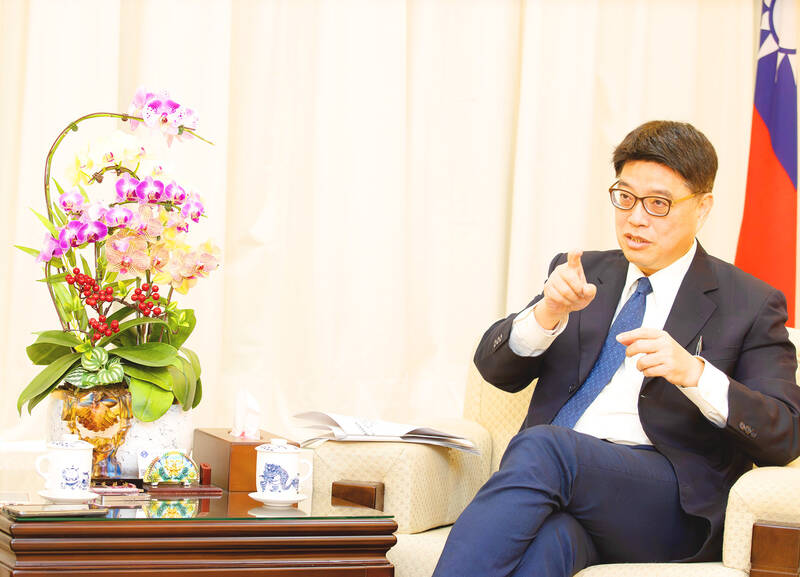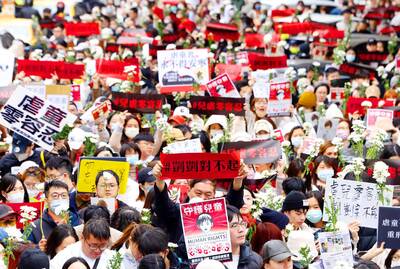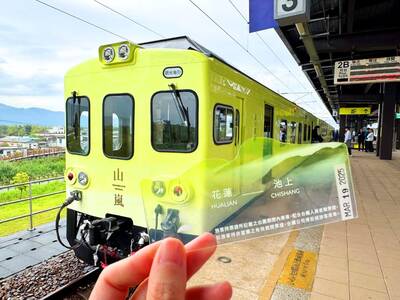Steps taken by the Mainland Affairs Council (MAC) to counter Beijing’s “united front” efforts would not evoke the specter of McCarthyism in Taiwan, as they are in the best interests of Taiwan and would not hurt its people, MAC Minister Chiu Chui-cheng (邱垂正) said.
Chiu made the remarks in an interview with the Central News Agency as he outlined some of the approaches the MAC has adopted to address the challenges of dealing with Beijing.
On June 21, around one month after President William Lai (賴清德) took office, Chinese authorities announced a set of legal guidelines targeting advocates of Taiwanese independence, with the most severe punishment being the death penalty.

Photo: CNA
The guidelines’ scope was “extremely broad and overly expansive,” Chiu said, adding that, under the provisions, anyone who does not support the Chinese Communist Party’s unification policies “could almost certainly face legal consequences.”
In response, the MAC raised the travel alert for China, Hong Kong and Macau to the second-highest “orange” level, and lodged a protest with Chinese authorities over the serious personal safety risks the rules posed to Taiwanese in China.
The protest included rejecting applications from high-ranking officials of China’s Taiwan Affairs Office (TAO) to visit Taiwan. Those denied entry included Jin Mei (金梅), director of the Shanghai Municipal TAO, earlier this month for the Taipei-Shanghai Twin-City Forum in Taipei.
The same approach would continue, Chiu said, adding that entry would only be granted if the officials would agree to meet with the MAC in a way where “we could lodge a protest regarding this matter [the issuance of the guidelines].”
Social infiltration that employs “united front” strategies aimed at dividing and influencing Taiwanese society has been part of Beijing’s actions since May 20 for “a multifaceted form of pressure” on Taiwan, he said.
While Chiu defined “united front” strategies as efforts to “exploit and create internal conflicts among adversaries,” some have said that Taiwan’s crackdown on such activities fosters an environment that could in time evoke the specter of McCarthyism.
McCarthyism, named after late US senator Joseph McCarthy, cultivated paranoid fear and suspicion of communist influence in the late 1940s and early 1950s, often leading to unjust accusations, social division and the suppression of differing opinions.
The term “united front” is often used by the MAC to denounce China’s attempts to influence Taiwan, including when it criticized a small number of Taiwanese entertainers for echoing China’s military threats against Taiwan in October.
As to whether a phenomenon similar to McCarthyism could occur in Taiwan, Chiu rejected such a possibility. Imposing a direct ban on suspected “united front” efforts would be “the quickest and simplest solution,” he said.
The MAC was against such a step because “it would undermine the principles of freedom and democracy, and disrupt the normal functioning of a constitutional democracy,” he said.
The MAC’s approach is to focus on educating the public to identify “united front” strategies and push for legislation, such as the Anti-Infiltration Act (反滲透法), to defend democracy, he said
Among other measures the MAC could resort to in countering Chinese threats is fostering international exchanges, Chiu said.
To build ties with like-minded democratic nations and help them manage their relations with China, Chiu said the MAC provides Taiwan’s overseas offices with detailed weekly reports on the cross-strait situation, offering in-depth analyses of bilateral relations.
Those reports are subsequently shared by Taiwan’s diplomatic missions with “local friends,” helping deepen collaboration on navigating relations with China, he said.
If there was an area in which there was hope for progress, it was tourism, but there was little indication from Chiu that the situation would improve in the near future.
In 2019, prior to the COVID-19 pandemic, Chinese visitors accounted for about one-quarter of all foreign visitors to Taiwan, but that source of tourism income has all but dried up, with independent or group travel largely frozen by the Chinese authorities for more than four years.
“The crux of the issue lies in the unwillingness [of Chinese authorities] to lift the travel ban,” Chiu said.
While some Chinese officials have expressed a willingness to ease restrictions, they have attached numerous conditions, said Chiu, who described some of the conditions as “involving political manipulation.”
If China’s lifting of the ban touches on political issues, or if tourism is used as a form of economic leverage against Taiwan, it would raise significant concerns for the MAC, he said.

Taiwan yesterday condemned the recent increase in Chinese coast guard-escorted fishing vessels operating illegally in waters around the Pratas Islands (Dongsha Islands, 東沙群島) in the South China Sea. Unusually large groupings of Chinese fishing vessels began to appear around the islands on Feb. 15, when at least six motherships and 29 smaller boats were sighted, the Coast Guard Administration (CGA) said in a news release. While CGA vessels were dispatched to expel the Chinese boats, Chinese coast guard ships trespassed into Taiwan’s restricted waters and unsuccessfully attempted to interfere, the CGA said. Due to the provocation, the CGA initiated an operation to increase

A crowd of over 200 people gathered outside the Taipei District Court as two sisters indicted for abusing a 1-year-old boy to death attended a preliminary hearing in the case yesterday afternoon. The crowd held up signs and chanted slogans calling for aggravated penalties in child abuse cases and asking for no bail and “capital punishment.” They also held white flowers in memory of the boy, nicknamed Kai Kai (剴剴), who was allegedly tortured to death by the sisters in December 2023. The boy died four months after being placed in full-time foster care with the

The Shanlan Express (山嵐號), or “Mountain Mist Express,” is scheduled to launch on April 19 as part of the centennial celebration of the inauguration of the Taitung Line. The tourism express train was renovated from the Taiwan Railway Corp’s EMU500 commuter trains. It has four carriages and a seating capacity of 60 passengers. Lion Travel is arranging railway tours for the express service. Several news outlets were invited to experience the pilot tour on the new express train service, which is to operate between Hualien Railway Station and Chihshang (池上) Railway Station in Taitung County. It would also be the first tourism service

The Chinese military has boosted its capability to fight at a high tempo using the element of surprise and new technology, the Ministry of National Defense said in the Quadrennial Defense Review (QDR) published on Monday last week. The ministry highlighted Chinese People’s Liberation Army (PLA) developments showing significant changes in Beijing’s strategy for war on Taiwan. The PLA has made significant headway in building capabilities for all-weather, multi-domain intelligence, surveillance, operational control and a joint air-sea blockade against Taiwan’s lines of communication, it said. The PLA has also improved its capabilities in direct amphibious assault operations aimed at seizing strategically important beaches,